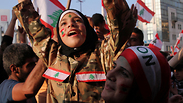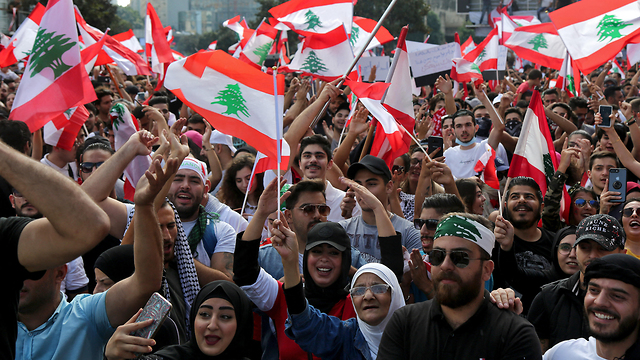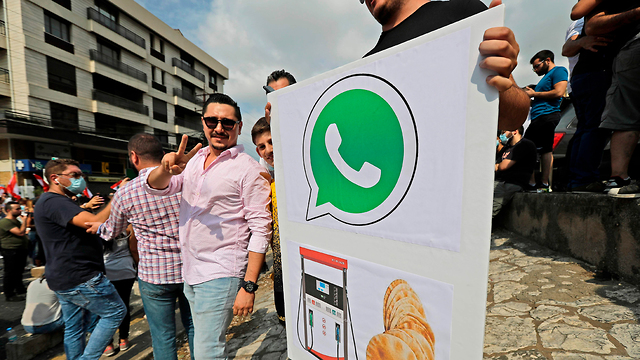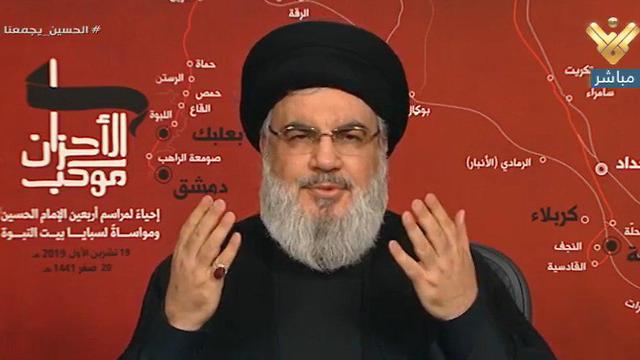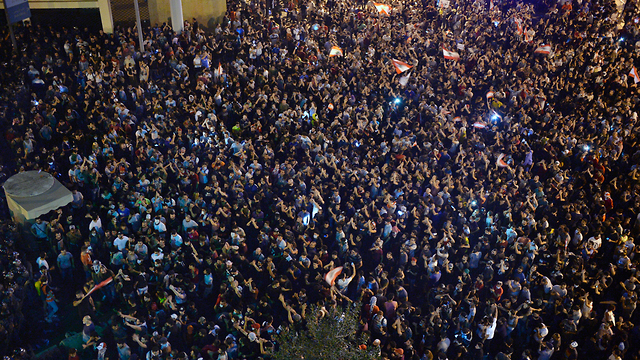The economic crisis that brought demonstrators out into the streets of Lebanon has been going on since the "Arab Spring" of 2011; every few months protests break out, sparked by different events.
One protest was over uncollected garbage, another over a proposed tax increase, and another still over pay cuts for government officials and members of the military. But the demonstrations that began last month were larger than any seen since the 1976 Lebanese civil war.
They were dubbed the "WhatsApp Intifada" because of a government effort to tax instant messaging calls, which have been cutting into cellular companies' profits.
The latest protests erupted even as Lebanon is facing economic calamity with one of the highest proportional national debts in the world, standing at $85 billion.
Unemployment among young Lebanese stands around 36% and while the population is growing in numbers, economic growth has been less than 1% for the past eight years.
The United States has imposed heavy sanctions on the Iranian-backed Hezbollah organization, but since the group is part of the government and involved in its institutions, these sanctions have been adversely affecting the already failing economy.
The Shiite organization holds three government portfolios - including the well-funded health ministry - and Lebanon's Christian president Michel Aoun is little more than its puppet.
Lebanon's political and economic problems are inextricable. Iran's growing control over the country and Hezbollah's growing strength have kept foreign investments away, bringing the local economy to a standstill.
Fouad Siniora, who was prime minister during the 2006 Second Lebanon War, said his country suffers from two major ills: one is the financial crisis that is the result of government refusal to implement much-needed reforms, and the other is its separate ethnic groups who consider their individual needs over the needs of the country as a whole.
Hezbollah is the epitome of this state of affairs, operating as a country within a country and conducting an ongoing conflict with Israel at the expense of the Lebanese people that will make Lebanese territory a battlefield in a fight between Iran and Israel.
The recent demonstrations were a reflection of Hezbollah's grip on the country and the public's fear of it.
Protesters targeted the offices of the Shiite Amal movement, calling for its leader's resignation, while Hezbollah and Iran were not targets of public ire at all.
Although the Lebanese understand that disarming Hezbollah is part of the solution to their economic woes, they are paralyzed by fear. All eyes were on Hezbollah leader Hasan Nasrallah's speech Saturday, warning demonstrators against turning their protest into a political one.
"The secret to their success," he said of the protesters, "is that they refrain from blaming any political party or taking any political action".
In an effort to veer away from any discussion of Iran's control in Lebanon, Nasrallah insisted that no political entity was responsible for the crisis, claiming it came as the result of 20-30 years of economic neglect by all Lebanese parties and governments.
But proof that the Lebanese protests are already political can be found in the protests in Iraq only two weeks ago.
Many Lebanese expressed support for the demonstrators in Iraq and see nuumerous similarities between the protests taking place in both countries, where demonstrators took to the streets to condemn corruption, poverty and Iran's hold on their governments.
Pro-Iranian Shiite militias in both Lebanon and Iraq operate to advance their own interests with no supervision or government intervention. The only noticeable difference is that Iran's hold on Iraq is not as complete as it is in Lebanon.
There is Iraqi opposition to the pro-Iranian government primarily in the impoverished south between Najaf and Basra. Iraqi demonstrators therefore have felt emboldened to burn Iranian flags and chant anti-Iranian slogans, while in Lebanon even the prime minister was reluctant to call out Hezbollah or Iran by name.
Hezbollah's fear that the protests in the southern Iraq could be imitated in Lebanon is understandable. In fact, it is for this reason that Nasrallah has chosen not to criticize protesters.
His main concern is that other Shiite residents, those affected by U.S. sanctions, would decide to join the demonstrations.
Footage of protesters in predominantly Shiite south Lebanon is a worry for the pro-Iran cleric. The demonstrators blocked roads and criticized Nasrallah: "You have starved us and still joined Hariri's government," they shouted.
The demonstrations in Lebanon are continuing, and Nasrallah must wonder whether Hariri will use them against Hezbollah and its leader.
For of they spiral out of control, they could blow up in Hezbollah's face.













